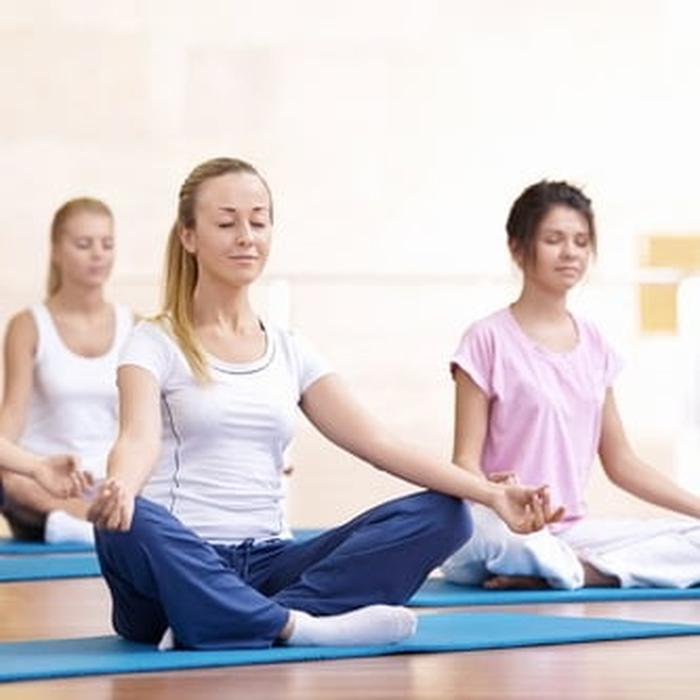
If you haven’t yet bought into the yoga-is-a-way-of-life worldview and you’re still pretty sure a “plank” belongs in a hardware store and a “feathered peacock” in a zoo, here’s some research for you: Even casual yogis can parlay their skills into big career benefits.
In addition to the well-known physical benefits of yoga, experts say that a consistent practice can help you handle workplace challenges, learn self-discipline, and have a more positive attitude. And according to William J. Broad’s The Science of Yoga, recent studies confirm that yoga can help reduce stress and improve emotional wellbeing, particularly in women. Why? Unlike most exercise methods, yoga works on both a physical and emotional level by promoting self-awareness, called “mindfulness” in the yoga community.
To learn more, we spoke with Mandy Ingber, Jennifer Aniston’s yoga instructor and the creator of the Yogalosophy DVD workout, and Kathryn Budig, creator of the Aim True Yoga DVD and founder of the animal charity Poses for Paws.
1. Yoga Boosts Self-Confidence
Any yoga lover remembers her first class—shaky legs, awkward attempts at poses, nervous glances around to see if anyone else is struggling, too. But, like most exercises and sports, you have to practice yoga to excel at it. And as you master contortions that once seemed difficult—even impossible—you build confidence. This process, Ingber says, creates a sense of your own strength and skill. It also taught her that “obstacles are opportunities,” as well as how to become aware of negative thought patterns and banish them.
And this is important not only on a yoga mat, but also in the office. Having a strong sense of confidence will give you great ability to handle all the requisite struggles and mistakes you’re bound to face as you move on up the corporate ladder.
2. Yoga Teaches Self-Discipline
Excelling at yoga requires a physical and mental commitment to get on your mat regularly. The yogic philosophy of mindfulness behind the physical poses encourages you to improve your skills gradually through daily work. You don’t burn yourself out by working 24/7 or competing with others; instead, you focus on yourself and make conscious and responsible choices.
Ingber says this mindfulness has helped her build a successful career as a celebrity fitness and wellness expert, author, speaker and producer. A TV actress in the 80s and 90s (Cheers, The Tortellis), Ingber often blogs about her struggles as an actress in her 20s and the negative impact the industry had on her self-esteem. But she says yoga and meditation help reshape her attitude and keep her focus on goal-setting. “I have enough structure to practice the skills that I need,” Ingber says. “I am willing to work very hard, yet I do not force anything.”
Similarly, Budig says that her practice keeps her from feeling overwhelmed, and relates that the discipline of regular yoga taught her how to juggle her many jobs at once. “Yoga is all about balance, so it prevents me from wearing myself too thin,” she says. “I can back off where I need to and move forward full throttle when the moment calls.”
3. Yoga Reduces Stress
Ingber’s description of yoga’s impact on her thought patterns and habits resonates with scientific data on how yoga can combat stress.
As Broad writes, yoga techniques and poses have a positive impact on the nervous system. Meditation, steady breathing, and restful poses such as Shavasana (“corpse pose”), which often end yoga classes, help slow the heart and relax the muscles. When the nervous system slows down, people feel calmer and more emotionally stable, Broad says.
Research suggests that yoga’s emotional impact can help people handle stressful situations better. Broad examines a 2009 Harvard Medical School study that found regular yoga practice helped reduce performance anxiety and improved the moods of young professional musicians in high-stress situations.
Learning to adjust your emotional reactions to career stress is a skill you can learn with practice. And yoga helps, as it teaches you to move through the uncomfortable and have the patience to stick with it, Ingber says.
Bottom line: you’ve got a career excuse for some zen on the mat. So now that you know you it’s possible to get exercise, anxiety relief, and boosted self-confidence all at the same time, what are you waiting for? There’s a feathered peacock with your name on it.
Ingber and Budig’s Tips for Getting Started
1. Find a beginner class you really love, a DVD, or a book at your skill level.
2. Schedule your yoga sessions. “Making the time and committing is key,” Ingber says. If possible, find a yoga buddy to hold you accountable.
3. Find the right studio for you: There are many yoga styles, so test the waters as well as different teachers. “Once you have (one)... that speaks to you, you can’t help but want to show up,” Budig said.
4. Don’t want to pay for a class? That’s fine. The beauty of yoga is that all you need is your body and a mat, and you can learn the basics from a DVD or online video. Then all you’ve got to do is move to (or create) a space that inspires you. If just being in the vicinity of your computer stresses you out, drag the mat to the living room.
5. For a yoga session at home, Ingber recommends starting with simple poses and five minutes of meditation. Standing poses help strengthen your body, balancing poses improve stability, and deep stretches on the mat increase flexibility. End your practice with another five minutes of meditation.